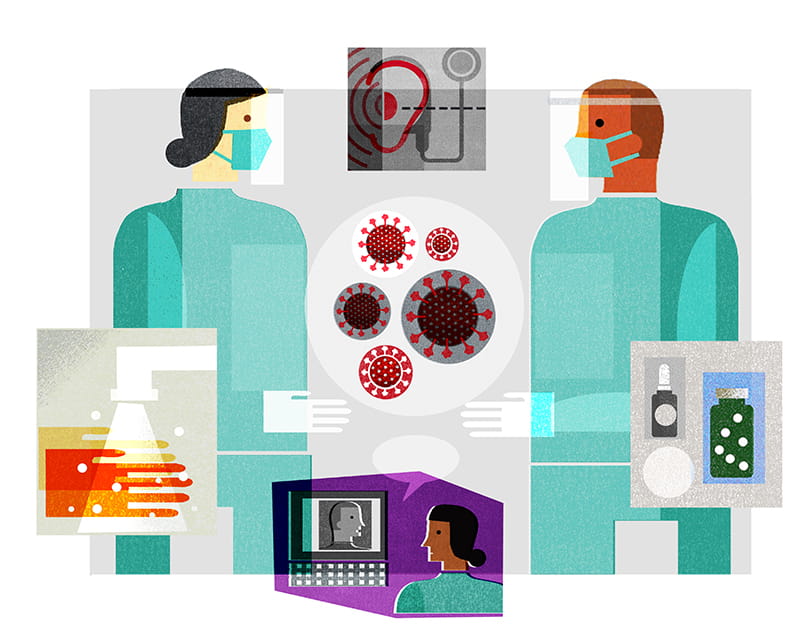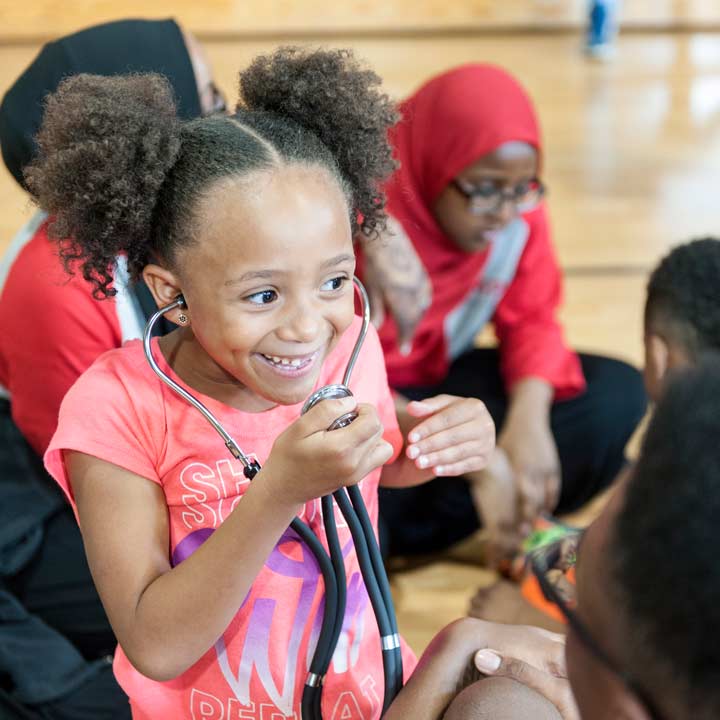
2020 Annual Report
 Supporting parents and caregivers of deaf and hard-of-hearing children through research is core to the mission of the Buckeye Center for Hearing and Development (BCHD) at The Ohio State University College of Medicine. Sometimes, that support comes in novel ways.
Supporting parents and caregivers of deaf and hard-of-hearing children through research is core to the mission of the Buckeye Center for Hearing and Development (BCHD) at The Ohio State University College of Medicine. Sometimes, that support comes in novel ways.
Most recently, the center received $250,000 in funding from the Patient-Centered Outcomes Research Institute (PCORI) for a two-year project focused on building capacity for stakeholder engagement in research. This includes providing caregivers with the knowledge necessary to participate in and drive research.
“BCHD’s research is centered on empowering parents and caregivers. We want to arm them with enough knowledge about outcomes to help them decide what is best for their deaf or hard-of-hearing children,” says Carrie Davenport, PhD, project lead and postdoctoral research scholar in the Ohio State Department of Otolaryngology – Head and Neck Surgery. “This latest project is in line with that mission.”
The project will result in a Family Research Council, a group of 10 to 12 parents and caregivers who’ll help develop a research agenda for BCHD that’s aligned with caregiver needs.
“In the process of getting this project funded, we were able to bring clinicians, scientists and educators together to engage in a series of discussions on how to provide better resources for kids,” says Irina Castellanos, PhD, director of BCHD, project co-lead and assistant professor in the Department of Otolaryngology – Head and Neck Surgery. “We want to make Ohio the most supportive state for deaf children. This project is an important step in that direction.”
The origins of this project began in 2016. At the time, Ohio’s Early Hearing Detection and Intervention (EHDI) system underwent significant changes in how early intervention services were provided.
This shift resulted in a reduction in families enrolling in early intervention – a reduction providers noticed. As a result, a community collaboration involving providers, families, deaf adults and BCHD researchers from across the state came together to figure out ways to respond to this decrease.
With funding from the Oberkotter Foundation, the community collaboration embarked on a year-long discovery phase, surveying stakeholders and conducting focus groups. These efforts helped inform the development of the next phase: the capacity-building project funded by PCORI.
This project is not to conduct research but to build capacity for parents and caregivers of deaf and hard-of-hearing children to meaningfully engage in the research process from beginning to end.
In the first year of the project, the team will develop training modules to deliver to a group of parents and caregivers who’ll be part of the Family Research Council. This council will learn about the Ohio EHDI system, the research process and the kinds of research conducted at BCHD.
“We’re aiming to do research with caregivers instead of about them,” Dr. Davenport says. “There have been research studies that incorporate parents, but this is flipping their role and moving them inside the research process. This process is an innovation in our field.”
That process, known as participatory research, is a relatively new concept in the research world. Participatory research involves engaging directly with the stakeholder in research design and methodology, taking a collaborative approach instead of a top-down one.
One of the consultants on this project is Lisa Vaughn, PhD, a community-based participatory research expert at Cincinnati Children’s Hospital Medical Center. Dr. Vaughn’s process involves going beyond asking questions of participants and identifying other places where stakeholders can be involved in collecting data and translating findings.
Nationwide Children’s Hospital, a partner of BCHD, is also playing a collaborative role in this project, including reaching out to families to engage in the project. Ursula Findlen, PhD, research director in the Department of Audiology’s Division of Clinical Therapies at Nationwide Children’s Hospital and clinical assistant professor in the Department of Otolaryngology – Head and Neck Surgery, is overseeing recruitment, developing training and strategizing how to integrate research priorities into programs at Nationwide Children’s Hospital.
One aim of this capacity-building project is to have parents and caregivers of deaf and hard-of-hearing children co-present research findings alongside scientists at BCHD.
“For parents and caregivers of deaf and hard-of-hearing children, complex problems come up very quickly,” Dr. Davenport says. “We want to bring stakeholders in at every stage to find solutions for these problems together through these participatory research methods.”
In the second year of the project, the BCHD team will facilitate focus group discussions to generate input on the research agenda, including a list of topics for research around supporting the development of deaf and hard-of-hearing children.
“While basic research advances scientific theories, it doesn’t always help parents navigate their day-to-day challenges,” Dr. Castellanos says. “We are not trying to supplant any research, but rather approach the early intervention years with an additional piece to the puzzle.”
Eventually, Dr. Davenport hopes caregivers who participate in this project will partner long-term to help with future research from this agenda.
“This research agenda will give us a direction for efforts in future research, as well as identify sources of funding for families to be engaged in research,” Dr. Davenport says. “The goal is that our research can become better aligned with families’ priorities.”